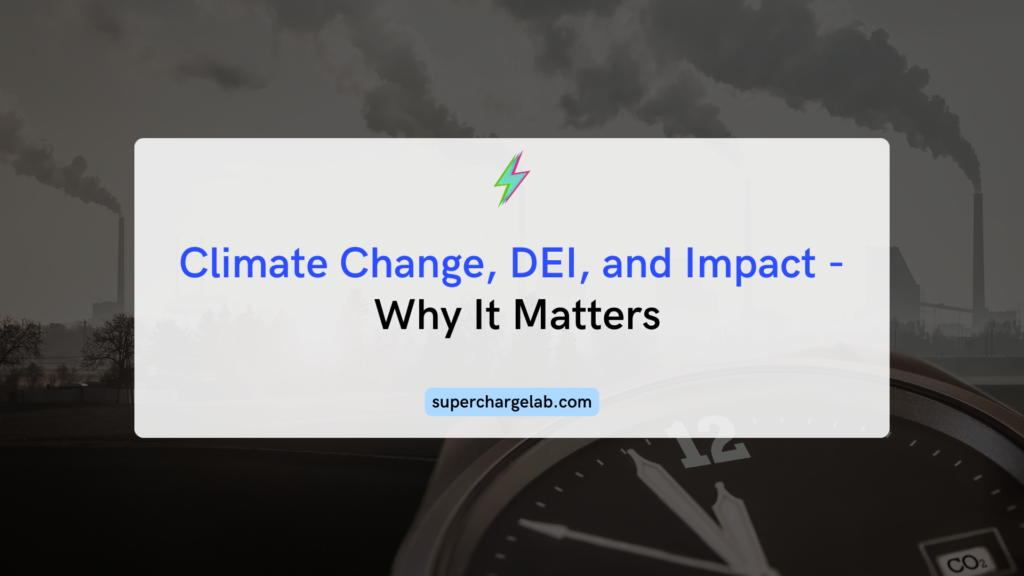
The dynamic field of global issues has given rise to three interrelated pillars that will significantly influence the future: diversity, equity, and inclusion (DEI), climate change, and the quest to achieve return through impact. The challenges that the world face are significant, and they come together to form a fabric that defines the course of our journey as a part of the human race. In this piece, we explore the reasons that the relationship between Impact, DEI, and Climate Change is not just pertinent but also essential for a fair and sustainable future.
The Emergency of Climate Change
Following the important COP28 decision to end the fossil fuel age, the government has prepared a potent financial tool: money for scrubbed carbon. In addition to pledging to double energy efficiency and triple renewable energy by 2030, the global climate summit also unleashed a flurry of financial incentives and more stringent carbon capture laws. This combination of ambition and financial incentives promises to transform the battle against climate change, transforming carbon removal from a specialized technology into a worldwide force for economic growth and environmental responsibility.
We all have a vital part to play in reducing climate change, as individuals and corporations. We make a positive impact on the environment by embracing renewable energy sources, scaling down our carbon footprint, and implementing sustainable practices to achieving net zero. Communities globally are impacted by the indiscriminate effects of climate change. Therefore, combating climate change is inextricably linked to advancing justice and equity throughout the world.
Inclusion, Diversity, and Equity: Sparks of Positive Change
DEI, or diversity, equity, and inclusion, are more than just catchphrases; they are the foundation for creating a future in which everyone prospers. DEI programs go beyond simple representation by tearing down structural obstacles and providing marginalized groups with the tools and chances they are entitled to. And there are significant benefits: There is a significant relationship between diversity and financial performance, according to research from McKinsey’s “Delivering Through Diversity” report. Businesses with diverse executive teams, for example, have a 33% higher chance of seeing above-average earnings; similarly, companies with diverse boards benefit 43% more. McKinsey found that organizations in the top 25th percentile for executive gender diversity have 15% higher profitability, demonstrating the enormous influence that even gender diversity can have. DEI aims to maximize the potential of our workers and not just focus on justice.
Impact’s Power: Impacting Businesses, Empowering Communities
Impact is more than a simple buzzword; it’s a force that’s revolutionizing the way that businesses run. Impact promotes the triple bottom line of people, planet, and prosperity rather than just profit. This bigger picture is about creating new opportunities for success rather than merely doing good. Underrepresented communities, which frequently lack development, offer excellent opportunities for growth and value generation. Businesses may reach untapped markets, encourage innovation, and make significant profits by fulfilling their requirements through impact-driven projects. At the same time, they can also positively influence the environment and society. Additionally, impact-driven firms are drawn to DEI principles because they understand the value and strength that different viewpoints offer.
The Intersection of Impact, DEI, and Climate Change
These three pillars coming together create an opportunity that enhances each of their own capabilities. Impact-driven climate solutions that apply DEI principles tackle social injustices in addition to environmental problems. The complex relationships that exist between social justice, economic prosperity, and environmental health are taken into account in a holistic approach to sustainability.
For example, a renewable energy project designed with the principles of DEI generates employment possibilities for disadvantaged populations in addition to lowering carbon emissions. In that same vein, an organization dedicated to Impact might implement climate-friendly practices and give top priority to the welfare of its diverse staff.
A Vision for the Future
Understanding the interconnectedness of Climate Change, DEI, and Impact is paramount for steering our world towards a sustainable and just future. By acknowledging and actively addressing these challenges, we can forge a path that ensures resilience, inclusivity, and positive change.
As individuals and businesses, our actions matter. We have the agency to influence change, and the choices we make today will reverberate through generations. Embracing sustainable practices, fostering diversity and inclusion, and prioritizing positive impact are not just ethical decisions; they are essential for the survival and prosperity of our planet and its inhabitants.
Let’s explore how your initiatives, ideas, or questions can contribute to the intersectionality of Climate Change, DEI, and Impact. Your commitment to positive change matters, and together, we can build a sustainable, inclusive, and impactful future.
Connect with us at www.calendly.com/annecheng . You’re not just scheduling a meeting; you’re committing to a better future.